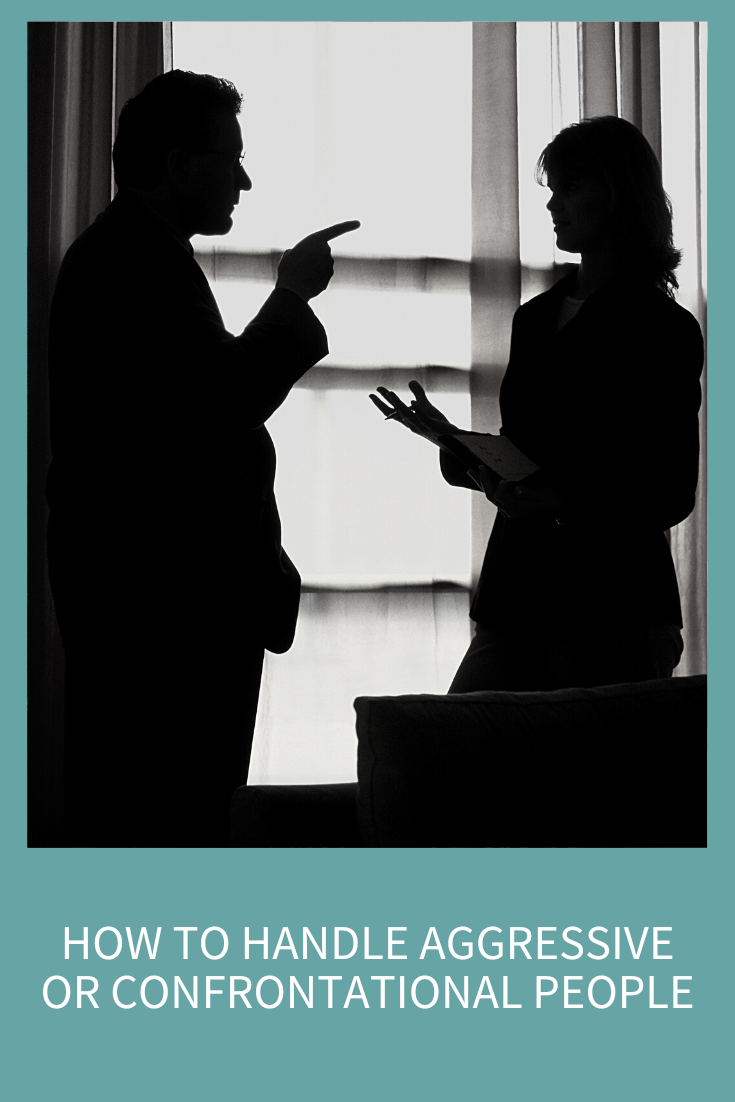
Whether it’s a coworker, friend, parent, or partner, dealing with people who are aggressive or confrontational is exhausting. They try to bulldoze, argue or dominate, which leaves you feeling inadequate, frustrated, upset, or resentful. But all that’s going to change after today! Stay tuned to better understand why people are aggressive and confrontational and my three-step process for handling these situations with more ease and peace.
7-minute read
Before we begin, I want to be clear that, for our purposes today, I’m not going to discuss physical aggression or abuse since that’s a huge topic and something you should address immediately with a qualified therapist, healthcare provider, or legal system.
What Aggressiveness Looks Like:
Whether you call it confrontational, inconsiderate, rude, or even abusive, aggressiveness is a difficult behavior to handle. When you’re dealing with an aggressive person, they’re often impolite and inconsiderate, which immediately creates a space where it’s hard not to be defensive or run the other way!
We, psychologists, divide aggression into two main categories, with one focusing on emotions and the other on behaviors:
#1: Impulsive Aggression (also known as affective or reactive aggression)
Impulsive aggression is the one that’s all about strong emotions. This type of aggression isn’t planned and happens in the heat of a moment, like when you accidentally cut someone off in traffic, and they go full road rage. This is also what happens when you ask your partner to stop dragging the knife directly from the peanut butter into the jelly, and the next thing you know, you’re in a screaming match and talking about breaking up. They get angry, defensive, outraged, or enraged in a moment, and they attack because they feel threatened.
#2: Instrumental Aggression (also known as predatory aggression)
Instrumental aggression is about how some people behave as they try to reach a goal. This type of aggression isn’t spur of the moment. Instead, it’s premeditated and carefully planned. This is when someone does something shitty and says that the end justifies the means. Maybe my goal is sex with as many people as possible and if I have to say that I love you (even though I don’t) to make that happen, then so be it. The next day I’m cold and angry if you try to ask me what’s wrong. This type of aggression is also common in a workplace where someone has a goal to get ahead and steps on your back to make that happen.
What’s the difference between being aggressive and just being angry?
The difference is that one is a state, so more constant, while the other is a trait, so more intermittent. Anger is a state, not a trait. In other words, we get angry in a moment because of an external factor, but it goes away as the external cause dissipates from memory.
Constant aggressiveness is something different. This is more of a trait than a state, meaning that aggressiveness is actually someone’s personality trait. There’s been research looking into the types of personality traits most often seen in aggressive people, and the common characteristics (besides the aggressiveness itself) are:
- Trait irritability which boils down to a tendency to be angry and reactive to slight provocations and disagreements, things that wouldn’t anger others generally.
- Trait anger which means that, in this instance, anger is a trait, not a state. It means the person has a disposition wherein they perceive a wide range of situations as annoying or frustrating and have a tendency to respond to these situations with elevations in state anger. They’re easily prone to anger. They show anger more frequently and for longer periods of time, and they have higher levels of physical arousal and negative expressions like arguing or being insulting.
- Type A personality which refers to a personality associated with competitiveness, high achievement, and impatience.
- Hostile Rumination. There’s actually something called The Dissipation–Rumination Scale, which rates the interval of time between an ‘instigation’ and when someone reacts with aggressiveness. On one end, people are inclined to let things go and overcome any reactive feelings they might be having while, on the other end, you’ve got someone who doesn’t allow these feelings to dissipate and, instead, ruminates in a hostile way and thinks of revenge scenarios or retaliations.
- Emotional susceptibility (tendency to feel inadequate or vulnerable)
- Narcissism
- Impulsivity
Why People are Aggressive
There are lots of reasons why people are confrontational or aggressive. I’d say that almost all of them come down to control. They fear losing control and/or want more control (again, from fear) in a given situation. Some specific reasons someone might act aggressively include:
- Low self-esteem and feelings of inadequacy and insecurity
- Fear of intimacy, so they push others away
- They feel misunderstood, frustrated, unheard, or mistreated
- To feel superior or to show dominance
- To compete and win or show others that they’re better
- Because they’ve got an untreated (or undertreated/mistreated) mental illness such as depression, anxiety, substance abuse, or narcissism
Dealing with aggressive and confrontational people can be draining, so it’s important to use something like my three-step process for dealing with aggressive and confrontational people.
Step #1: Understand How it Affects You
When you’re dealing with aggressive or confrontational people, it generally creates particular feelings in you:
- Anger or aggressiveness
- Stress and fear
- Overwhelm or being triggered
- Defensiveness
First and foremost, you need to work on your own mindfulness in these situations and not allow yourself to be triggered. You need to work on having a meta-view of the situation so you can step back and be in control of your own emotions and reactions.
Step #2: Find the Love
Now that you see yourself more clearly as you relate to this person, it’s time to see them more clearly. This is a person who is run by fear. Think about it: someone who has high confidence and self-esteem never feels the need to threaten, lose their shit or react defensively. This aggressive person is showing you their low self-esteem and inability to manage themselves. It’s sad and deserves your empathy and compassion.
This person does NOT need your sympathy, however. This isn’t about feeling sorry for them and pitying them. Sympathy is only great if you’re dealing with something like a death. Otherwise, it’s all about empathy and compassion. Sympathy in these moments will make you codependent or condescending because you’ll either feel sorry for them, so ignore what you’re feeling and avoid speaking to them about it, or you’ll say something to them that’s pitying and unhelpful. Either of these reactions creates disconnection.
You can learn about my five steps to empathy if it’s something you want to improve. In the meantime, practice compassion and try to find the love as you see the aggressive person as a scared child instead of a scary monster. They’re doing their best with the tools they have, and their tools suck right now.
Step #3: Be Assertive
Now that you see yourself and your own reactions and you’re seeing the other person from a more compassionate and clearer stance, it’s time to take some action: It’s time for some assertive communication.
At its core, assertive communication comes from respect and compassion for yourself and the other person. It means you care about others without worrying about others. Being an assertive communicator will help you in all areas of your life, which is why I did a whole episode on the topic. Please go check that out, but for now, here are some things you can do to deal with this aggressive or confrontational person:
- Use the I Feel Formula
- Your mantra is: “I can’t control what they’re doing, but I can control my response.”
- Ask them how they feel. They’ll try to give you thoughts, but if you can keep at them, you’ll eventually get to a feeling. We connect with feelings, not thoughts, so this will be a step toward true connection and shifting the trajectory of the conversation. Getting the person in the here and now will often stop aggression. They’re scared, so if you can get them into the moment and to a place where they don’t feel a need to defend themselves, the aggression will calm.
- Hold your boundary. Be clear about what specific responses you’ll have if they continue to act this way with you in this conversation, and then follow through!
- Their reactions are 100% about them, no matter how much they might try to deflect or place them on you. What others say and do is a projection of their own reality. End of. Don’t take it personally. This is 100% about them, not you.
Resources for How to Handle Aggressive or Confrontational People
The Secret About Anger You’ve Got to Know
Are You Being Triggered in Your Relationship?
The Secret to Managing Your Emotions: A Step-By-Step Guide
Empathy in Relationships is the Key to Connection and Communication
How to be an Assertive and Effective Communicator
Boundaries: How to Identify Them and How to Hold Them
Research for How to Handle Aggressive or Confrontational People







